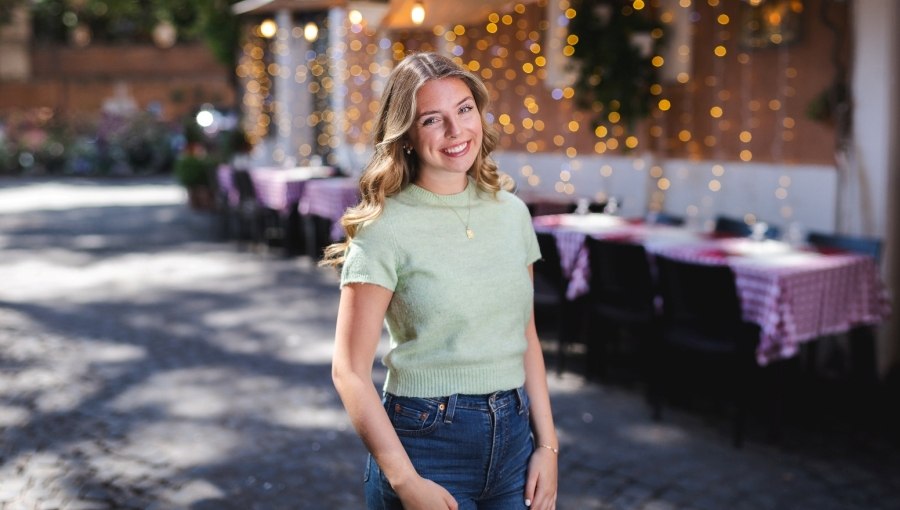A Stand Against Gender Inequality: History Major Kiriko Mechanicus
Kiriko Mechanicus is a History major and Communications minor from Amsterdam, Netherlands. She is the President of the Women’s Leadership Initiative (WLI), JCU’s student organization promoting women’s rights, and she is involved in the JCU Community Service Program. Together with the Business Club and Student Government, Kiriko recently organized the event “Far from Equal: The Gender Gap in the Workplace” that took place on February 24.

Kiriko Mechanicus
Tell us a little bit about the event you just organized.
Far from Equal was an opportunity to discuss the current situation of the gender gap in the workplace, both in Italy and the U.S. We had three guest speakers: Valerie Baxter (president of the Professional Women’s Association of Rome), Nicoletta Dentico (board member of Banca Popolare Etica), and Martina Romanelli (representative of the Young Women’s Network). Following the panel discussion, we also hosted a workshop called Breaking the Glass Ceiling. Sofie Lambert, who is a consultant at the Food and Agriculture Organization, organized a series of exercises tackling various types of gender stereotypes and discrimination in the workplace. The aim was not only to shed light on the issue, but also to give JCU students tools and strategies to cope with it.
Organizing this event was one of the highlights during my time as president of the Women’s Leadership Initiative. I believe that it is very important to address gender discrimination and to look for solutions. Beyond academics, it is really through my involvement in the community that I have been able to accomplish the most rewarding results. Twice a week I lead a group of volunteers that teaches English at the Casa Internazionale delle Donne (CID), Rome’s primary women’s rights association. On a daily basis I encounter women who are being violated and/or discriminated against. I think that both through my volunteer work at the CID and my involvement with WLI, I have been able to create safe spaces for women to share their stories and look for ways to fight gender imbalance together. I am very grateful to John Cabot University for giving me the opportunity to make this happen.
What attracts you to history?
One thing I’m learning in college is the importance of being a good storyteller. As a history student, I had many great professors throughout the years who each have a different approach to communication. I see a huge culture shift in academics where the transmission of information is communicated through visual representation rather than from books. I believe that this skill can be transferred to any profession and I hope to take this change into my own hands and work on it in the future. There are so many more stories to tell!
As technology progresses, are paper books destined to disappear?
For the most part, books are already disappearing. As students, we do a lot of our work by looking at documentaries and power point slides rather than pages of a book, for instance. In the study of history that transition is a little bit difficult, because we look at primary sources which are obviously paper. I think it would be very interesting to experiment with the new technologies we have nowadays and I believe they could be highly implemented in teaching. For instance, Professor Massimo Betello took us to the Forum of Caesar at night and there were projections all around so that you felt as if you were walking through the old forum.
What is your career goal?
This summer I will be attending an intensive 8-week workshop on documentary filmmaking at the New York Film Academy. Along with my history courses, I have been able to take some filmmaking courses at JCU, which allowed me to produce a number of short movies. This made me realize that I want to continue to develop my filmmaking skills. I am currently working on a series of short documentaries about multi-ethnicity in Rome. I have also been working for a very long time on a project called Unseen Rome. I’d like to introduce audiences to different people, locations, and stories from people who are living in Rome but are not Italian.
How did you find out about John Cabot?
I decided to move to Rome because I figured that this was the ideal place to study history. You walk around the city and you are surrounded by the things you are studying in your textbook. I think Italy is a very fascinating country and I wanted to move to a bigger city. Amsterdam is relatively small and at one point you know everyone, you know all the places, while Rome is so majestic that it is an unlimited source of inspiration.
After spending a few weeks at Rome’s largest public university, I realized that I wasn’t quite able to fit in. Coming from a small high school in Amsterdam, I missed the intimacy of a place where I knew my peers and teachers by name (or at least by face!). When paying a visit to the John Cabot University campus I immediately understood that this was the right place for me.
Any advice for a new student starting out at JCU?
Try to get involved with the community as soon as you get here! Join a club, volunteer, attend events, go on trips and/or join a sports team! Not only is it the best way to get to know new people, but you learn just as much from these activities as you do from your professors.





